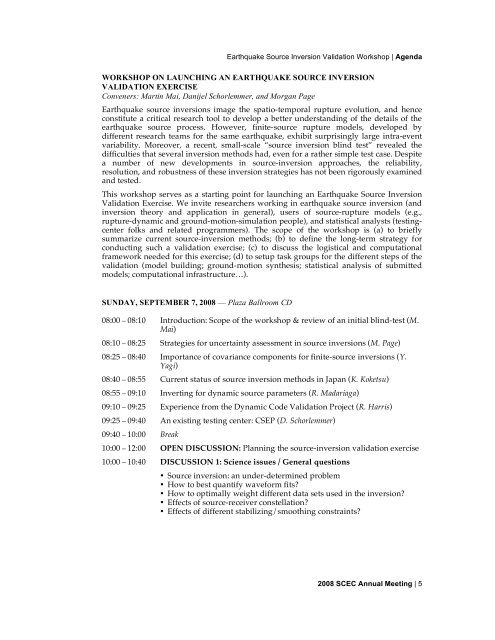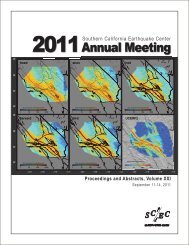Annual Meeting - SCEC.org
Annual Meeting - SCEC.org
Annual Meeting - SCEC.org
- TAGS
- annual
- meeting
- www.scec.org
Create successful ePaper yourself
Turn your PDF publications into a flip-book with our unique Google optimized e-Paper software.
Earthquake Source Inversion Validation Workshop | Agenda<br />
WORKSHOP ON LAUNCHING AN EARTHQUAKE SOURCE INVERSION<br />
VALIDATION EXERCISE<br />
Conveners: Martin Mai, Danijel Schorlemmer, and M<strong>org</strong>an Page<br />
Earthquake source inversions image the spatio-temporal rupture evolution, and hence<br />
constitute a critical research tool to develop a better understanding of the details of the<br />
earthquake source process. However, finite-source rupture models, developed by<br />
different research teams for the same earthquake, exhibit surprisingly large intra-event<br />
variability. Moreover, a recent, small-scale “source inversion blind test” revealed the<br />
difficulties that several inversion methods had, even for a rather simple test case. Despite<br />
a number of new developments in source-inversion approaches, the reliability,<br />
resolution, and robustness of these inversion strategies has not been rigorously examined<br />
and tested.<br />
This workshop serves as a starting point for launching an Earthquake Source Inversion<br />
Validation Exercise. We invite researchers working in earthquake source inversion (and<br />
inversion theory and application in general), users of source-rupture models (e.g.,<br />
rupture-dynamic and ground-motion-simulation people), and statistical analysts (testingcenter<br />
folks and related programmers). The scope of the workshop is (a) to briefly<br />
summarize current source-inversion methods; (b) to define the long-term strategy for<br />
conducting such a validation exercise; (c) to discuss the logistical and computational<br />
framework needed for this exercise; (d) to setup task groups for the different steps of the<br />
validation (model building; ground-motion synthesis; statistical analysis of submitted<br />
models; computational infrastructure…).<br />
SUNDAY, SEPTEMBER 7, 2008 — Plaza Ballroom CD<br />
08:00 – 08:10 Introduction: Scope of the workshop & review of an initial blind-test (M.<br />
Mai)<br />
08:10 – 08:25 Strategies for uncertainty assessment in source inversions (M. Page)<br />
08:25 – 08:40 Importance of covariance components for finite-source inversions (Y.<br />
Yagi)<br />
08:40 – 08:55 Current status of source inversion methods in Japan (K. Koketsu)<br />
08:55 – 09:10 Inverting for dynamic source parameters (R. Madariaga)<br />
09:10 – 09:25 Experience from the Dynamic Code Validation Project (R. Harris)<br />
09:25 – 09:40 An existing testing center: CSEP (D. Schorlemmer)<br />
09:40 – 10:00 Break<br />
10:00 – 12:00 OPEN DISCUSSION: Planning the source-inversion validation exercise<br />
10:00 – 10:40 DISCUSSION 1: Science issues / General questions<br />
• Source inversion: an under-determined problem<br />
• How to best quantify waveform fits?<br />
• How to optimally weight different data sets used in the inversion?<br />
• Effects of source-receiver constellation?<br />
• Effects of different stabilizing/smoothing constraints?<br />
2008 <strong>SCEC</strong> <strong>Annual</strong> <strong>Meeting</strong> | 5



